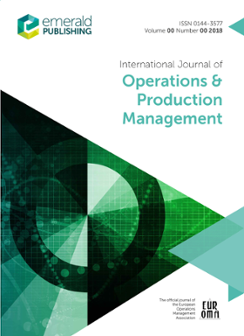Research published in 2023
In technology-based luxury supply chains
Original equipment manufacturers (OEMs) have increasingly turned to their supply networks as a strategic source of competitive advantage. To ensure that the suppliers meet the expected capability enhancement goals, focal firms often need to engage in “supplier development” (SD) activities.
This project provided novel insights on the possible dysfunctional outcomes of collaborative interorganizational efforts such as supplier development, whereby the successful completion of SD activities in achieving a project’s targets does not necessarily yield mutual relationship commitment.

Abstract
This paper aims to examine how collaborative supplier development (SD) activities, supplier capabilities and buyer–supplier relationship interrelate in technology-based, luxury product business contexts characterized by small volumes, difficult targets and resource constraints relative to those targets. Using inductive case research method, the authors investigate multiple embedded cases involving six dyadic buyer–supplier relationships of two luxury product manufacturers in the motorcycle and automotive industries. Each dyad represents an important sub-system for which the buying firm committed significant SD efforts to help the supplier successfully achieve difficult targets. The analysis reveals how paradoxical tensions might emerge as the firms engage in successful SD activities, which could lead to decreasing relationship commitment ultimately resulting in the termination of the relationship. The authors utilize the “value co-creation and value capture” paradox framework to understand the SD and relationship dynamic and characterize it as developing-leveraging paradox to explain its dualities, i.e. commitment-based SD efforts (increasing value co-creation), and unilateral leveraging of the newly acquired capabilities (increasing value capture) by both the buyer and the supplier. Overemphasis on value capture by one of the exchange partners spurs a detrimental vicious cycle leading to the decline of the relationship. The study explains the paradoxical dynamics that may emerge in SD activities of innovative, technologically complex, luxury product firms. The findings contribute to the SD literature by highlighting how learnings from SD activities could contribute to the dark sides of buyer–supplier relationship. The technologically complex, luxury product contextual characteristics of the study may limit the generalizability of the study findings. The study provides novel insights into the emergence and management of paradoxes in buyer–supplier relationships, in terms of virtuous and vicious dynamics of developing-leveraging.
This research project was conducted in collaboration with:
Paolo Barbieri (Bologna)
Santosh K. Mahapatra (Clarkson)

“A paradoxical tension between developing (value co-creation) and leveraging (value capture) may emerge in a buyer–supplier relationship for technologically complex luxury products, wherein successful supplier development activities may counterintuitively lead to the decline of the relationship.”
Even in successful SD experiences, a dark side of these activities may lie in the supplier’s decision to leverage its improvements, outside the relationship, to do business with other customers, and to reduce its commitment to the relationship with the buyer.

There is a dark side for the supplier as well. In fact, as shown in our longitudinal analysis, the buyer may also
leverage the newly absorbed capabilities to either internalize or broaden its sourcing from
another supplier.
Back to Business Ecosystems

